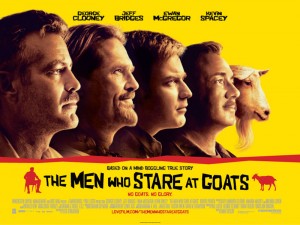THE MEN WHO STARE AT GOATS: 3 1/2 STARS
 “The Men Who Stare at Goats” is the best movie with the worst name that we’ll likely see this year. Despite its silly title—which makes perfect sense in context of the movie, but will be a mystery to anyone unfamiliar with the story—this screwball George Clooney film has many serious points to make about the state of modern warfare, but does so with a healthy dose of satire.
“The Men Who Stare at Goats” is the best movie with the worst name that we’ll likely see this year. Despite its silly title—which makes perfect sense in context of the movie, but will be a mystery to anyone unfamiliar with the story—this screwball George Clooney film has many serious points to make about the state of modern warfare, but does so with a healthy dose of satire.
Based on a story that is “more true than you think” it begins when journalist Bob Wilton (Ewan McGregor) uncovers a story about the New Earth Army, a secret psychic battalion of super soldiers sponsored by the US government in hopes of finding a new way to fight wars. The Pentagon wants to be the first super power to develop super powers. Teaming up with Lyn Cassidy (Clooney), a veteran psychic soldier, Wilton tracks down Cassidy’s mentor Bill Django (Jeff Bridges), an eccentric New Age shaman now working at a prison camp in Iraq run by Kevin Spacey’s character, Larry Hooper. Hooper is a former psychic soldier who lived in Cassidy’s shadow until he managed to subvert the original purpose of the New Earth’s Army and take control.
Directed by hyphenate actor-turned-George Clooney’s best friend-turned-writer-turned-director Grant Heslov, the pen behind “Good Night and Good Luck” the movie has a wonky feel right from the get go. Its dizzying blend of slapstick, satire and drama is a hard thing to pull off, but Heslov with the help of his lead actors and a strong supporting cast including Coen Brothers regular Stephen Root, find just the right tone for the first hour.
In fact, the first sixty minutes of “The Men Who Stare Sat Goats” is giddy good fun; as fun a ride as there is in theatres this year. Its absurdist, filled with memorable images—Clooney staring down a goat, enlisted men doing the Watusi and a montage of Jeff Bridges embarking on a journey of enlightenment—and no joke is too broad. It’s as if Crosby and Hope had gone to Iraq instead of Singapore or Utopia. Then along comes Kevin Spacey who ruins all the fun.
It’s as if the filmmakers were afraid to stick to their guns and make a surreal free form movie so they added Spacey’s sniveling character to add in some conflict. It’s meant to up the drama of the piece but it’s the point at which the movie loses much of its zip. The conflict Spacey brings is simply not as interesting as the rest of the film. The final third of the film suffers for it, but it remains an unpredictable romp with some nice performances and pointed comments on the absurdity of war. I couldn’t help but think that if someone like Robert Altman had made this film in 1974 the message and the madness would have been intact without the spoiler of Spacey.
